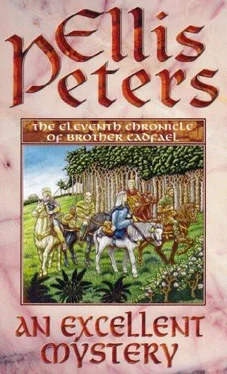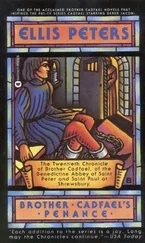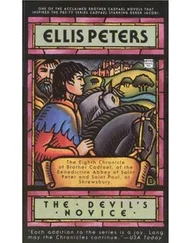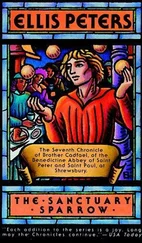She came through the crowd on her brother’s arm, no great beauty, simply a tall girl in a dark cloak and gown, with a grave oval face austerely framed in a white wimple and a dark blue hood. Sister Magdalen and Aline between them had done well by her. The general mourning forbade bright colours, but Aline had carefully avoided providing anything that could recall the rusty monastic black. They were of much the same build, tall and slender, the gown fitted well. The tonsure would take some time to grow out, but hiding the ring of chestnut hair completely and covering half the lofty brow did much to change the shape of the serious face. She had darkened her lashes, which gave a changed value and an iris shade to the clear grey of her eyes. She held up her head and walked slowly past men who had lived side by side with Brother Fidelis for many weeks now, and they saw no one but Juliana Cruce, nothing to do with the abbey of Shrewsbury, simply a nine days’ wonder from the outer world, interesting now but soon to be forgotten.
Nicholas watched her draw near, and was filled with deep, glowing gratitude, simply that she was alive. Her life might have no place for him, but at least it was hers, all the years he had thought stolen from her by a cruel crime, while here, it seemed, was no crime at all. He could, he would, make the assay, but not yet. Let her have time to know him, for she knew nothing of him yet, and he had no claim on her, unless, perhaps, Hugh Beringar had told her of his part in the search for her. Even that gave him no rights. Those he would have to earn.
But as she drew level with him she turned her head and looked him in the eyes. An instant only, but it was enough.
Cadfael saw him start and quiver, saw him open his lips, perhaps to cry out in the sheer shock of recognition. But he made no sound, after all. Cadfael had gripped him by the arm, but released him at once, for there had been no need. Nicholas turned on him a face of starry brightness, dazzled and dazzling, and said in a rapid whisper: “Never fret! I am the dumb one now!”
So quick and agile a mind, thought Cadfael approvingly, would not be put off by difficulties. And the girl was still barely twenty-three. They had time. Why should a girl who had had the devoted company of one fine man therefore fail to appreciate the value of a second? I wonder, he thought, what Humilis said to her at Salton that last day? Did he know, in the end, what and who she was? I hope he did. Certainly he knew the candlesticks and the cross, once Hugh described them to him, for of course she took them with her into Hyde, and with Hyde they must have gone to dust. But then, I think, he was in two minds, half afraid his Fidelis had been mixed up in Juliana’s death, half wondering… By the end, however the light came, surely he knew the truth.
In his chosen stall next to Brother Urien, Rhun leaned close to whisper: “Look! Look at the lady! This is she who should have been wife to Brother Humilis.”
Urien looked, but with listless eyes that saw only what they expected to see. He shook his head. “You know her,” said Rhun. “Look again!” He looked again, and he knew her. The load of guilt and grief and penitence lifted from him like a lark rising. He ceased to sing, for his throat was constricted and his tongue mute. He stood lost between knowledge and wonder, the inheritor of her silence.
Juliana emerged from the church into the temperate sunlight with the blankness of wonder, endurance and loss still in her face. Watching her from the shadow of the cloister, Nicholas abandoned all thought of approaching her just yet. Now that he understood at last the magnitude of what she had done, it became impossible to offer her an ordinary marriage and a customary love. Not yet, not for a long while yet. But he could bide his time, keep touch with her brother, make his way to her by delicate degrees, open his heart to her only when hers was reconciled and at peace.
She had halted, looking about her, withdrawing her hand from her brother’s as if she sought someone to whom recognition was due. The palest of smiles touched her face. She came towards Nicholas with hand extended. About the middle finger the little golden serpent twined in a coil, he caught the tiny glitter of its ruby eyes.
“Sir,” said Juliana, in a voice pitched almost childishly high, but very soft and sweet, “the lord sheriff has told me of all the pains you have been spending for me. I am sorry I have caused you and others so much needless trouble and care. Thanks are poor recompense for so much kindness.”
Her hand lay firm and cool in his. Her smile was still faint and remote, acknowledging nothing of any other identity but that of Juliana Cruce. He might have thought she was denying her other self, but for the clear, straight gaze of her grey eyes, opened wide to admit him into a shared knowledge where words were unnecessary. Nothing need ever be said where everything was known and understood.
“Madam,” said Nicholas, “to see you here alive and well is all the recompense I need or want.”
“But I hope you will come soon to visit us at Lai,” she said. “It would be a kindness. I should like to make better amends.”
And that was all. He kissed the hand he held, and she turned and went away from him. And surely this was nothing more than paying a due of gratitude, as she paid all her dues, to the last scruple of pain, devotion and love. But she had asked, and she was not one of those women who ask without meaning. And he would go to Lai, soon, yes, very soon. To make do with the touch of her hand and her pale smile and the undoubted trust she had just placed in him, until it was fair and honourable to hope for more.
They sat in Cadfael’s workshop in the herb-garden, in the after-dinner hush, Sister Magdalen, Hugh Beringar and Cadfael together. It was all over, the curious all gone home, the brothers innocent of all ill except the loss of two of their number, and two who had been with them only a short time, and somewhat withdrawn from the common view, at that. They would soon become but very dim figures, to be remembered by name in prayer while their faces faded from memory.
“There could still be some awkward questions asked,” admitted Cadfael, “if anyone went to the trouble to probe deeper, but now no one ever will. The Order can breathe again. There’ll be no scandal, no aspersions cast on either Hyde or Shrewsbury, no legatine muck-raking, no ballad-makers running off dirty rhymes about monks and their women, and hawking them round the markets, no bishops bearing down on us with damning visitations, no carping white monks fulminating about the laxity and lechery of the Benedictines… And no foul blight clinging round that poor girl’s name and blackening her for life. Thank God!” he concluded fervently.
He had broached one of his best flasks of wine. He felt they deserved it as much as they needed it.
“Adam was in her confidence throughout,” said Hugh. “It was he who got her the clothes to turn her into a young man, he who cut her hair, and sold for her the few things she considered her own, to pay her lodging until she presented herself at Hyde. When he said she was dead, he spoke in the bitterness of his heart, for she was indeed dead to the world, by her own choice. And when I brought him from Brigge, he was frantic to get news of her, for he’d given her up for lost after Hyde burned, but when I told him there was a second brother come from Hyde with Godfrid, then he was easy, for he knew who the second must be. He would have died rather than betray her. He knew the ugliness of which men are capable, as well as we.”
“And she, I hope and think,” said Cadfael, “must know the loyalty and devotion of which one man, at least, was capable. She should, seeing it is the mirror of her own. No, there was no other solution possible but for Fidelis to die and vanish without trace, before Juliana could come back to life. But I never thought the chance would come as it did…”
Читать дальше












